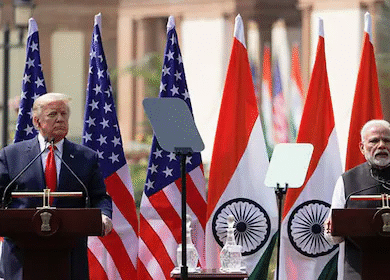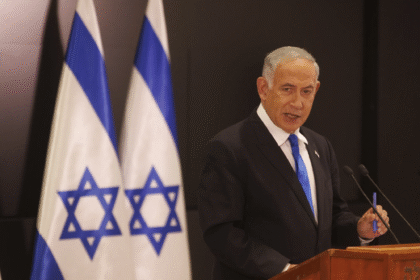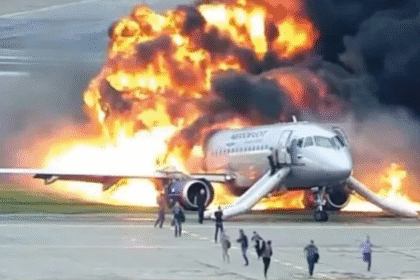Trump Hits Back at India Over Russia Trade Remark: Slams $14B US-Russia Commerce Amid Tariff Threat
Former US President Donald Trump responds sharply to India citing America’s $14B trade with Russia, dismissing tariff threat concerns with a blunt “Don’t know” remark
US President Donald Trump on Tuesday reacted to India citing the United States doing trade with Russia and yet criticising New Delhi for doing business with Russia. “I don’t know anything about it, I’d have to check, but we’ll get back to you on that,” he said in reply to a reporter’s question.
Trump announced 25 per cent tariffs on Indian imports and unspecified penalties last week, ahead of his August 1 deadline for tariffs to come into effect even as talks for a deal are ongoing. Later, Trump threatened to hike that rate due to New Delhi buying military equipment and oil from Russia, calling India “Russia’s largest buyer of energy, along with China”.
Hitting back at Trump’s tariff move, India pointed out to the US imports from Russia. “Where the US is concerned, it continues to import from Russia uranium hexafluoride for its nuclear industry, palladium for its

EV industry, fertilisers as well as chemicals,” Ministry of External Affairs spokesperson Randhir Jaiswal said.
Citing this, New Delhi called Trump’s targeting of India “unjustified and unreasonable”, and reiterated that the government would safeguard its national interests and economic security.
Even as Trump continues his tirade against India, threatening to raise tariffs and accusing the country of “fuelling the war machine” by doing business with Russia, his own party leader, Indian-American Nikki Haley, has come out in support of India.
Taking to X, the leader called India a “strong ally”, and urged against the US giving a pass to China. “India should not be buying oil from Russia. But China, an adversary and the number one buyer of Russian and Iranian oil, got a 90-day tariff pause. Don’t give China a pass and burn a relationship with a strong ally like India,” she wrote on X.
Meanwhile, Trump has also clarified that he never specified the tariffs the US would impose on countries buying Russian energy. The US President was asked if he would come through on his 100% tariff threat. “I never said a percentage, but we’ll be doing quite a bit of that. We’ll see what happens over the next fairly short period of time. But we will see what happens…”, he said.
His remarks came nearly a month after he threatened 100% tariffs on Russia and secondary tariffs on countries doing business with Moscow, as he gave a 50-day deadline for a truce in the Russia-Ukraine war.
Even in the face of Trump’s tariff threats, the Indian government has reportedly not issued any directives asking importers to reduce trade with Russia.
India clarified its stance on sourcing energy in particular, saying the country was “guided by what is on offer in markets and prevailing global situation”.
India also stated that the relationship it shares with any country should not be viewed through the prism of a third nation.
“The sourcing of defence requirement is determined solely by our national security imperatives and strategic assessments. Similarly, the sourcing of our energy needs…we are guided by what is available in the markets and by prevailing global circumstances,” Jaiswal said during a press briefing last week.
According to a Reuters report, in 2024-25, India purchased Russian oil worth $50.2 billion. India ramped up imports of discounted Russian commodities after the US and its western allies imposed sanctions on Russia as its war with Ukraine began in 2022.
In a development stirring fresh diplomatic buzz, former U.S. President Donald Trump has brushed aside India’s concerns regarding Washington’s trade ties with Russia. The controversy stems from India citing the $14 billion trade between the U.S. and Russia when justifying its own commerce with Moscow. However, Trump’s curt response — “Don’t know” — has triggered debate over America’s stance on global trade parity and the broader implications of U.S. tariff threats under a potential Trump administration 2.0.
The situation unfolded after Trump recently floated the idea of imposing higher tariffs on countries, including India, if re-elected in 2024. In response, Indian officials and policy analysts pointed out that while the West continues to pressure New Delhi over its energy and defense deals with Russia amid the Ukraine conflict, the U.S. itself maintains a steady trade relationship with Moscow, valued at nearly $14.4 billion in 2023. Much of this included agricultural imports, critical minerals, and medical supplies.

India argued that its own trade with Russia — largely energy-focused — is based on national interest and energy security, particularly given the discounted oil it has received since 2022. Officials contended that Washington’s criticisms appear hypocritical, given its own commerce with Russia continues quietly in the background.
When asked about India citing America’s trade with Russia in defense of its own, Trump offered a characteristically blunt reply: “Don’t know.” The former President did not elaborate further, leaving both Indian and U.S. political observers puzzled.
This brief remark has drawn both criticism and intrigue. Critics say Trump’s vague dismissal undermines serious international discourse, while supporters argue it’s consistent with his “America First” approach — one that prioritizes American economic interests over global diplomatic balancing.
The exchange comes as Trump leads the Republican ticket ahead of the November 2024 U.S. elections. His repeated threats to impose “reciprocal tariffs” on countries he accuses of taking advantage of the U.S. have reignited trade fears across global markets — especially in nations like India, which have complex economic ties with both the U.S. and Russia.
Trump has frequently targeted India in the past, calling it a “tariff king” and accusing it of unfair trade practices. A renewed Trump presidency could see a revival of tariff wars, with India potentially facing higher duties on sectors such as pharmaceuticals, IT services, and textiles — all vital to its export economy.
For India, maintaining a balanced diplomatic and economic relationship with both Russia and the U.S. is a cornerstone of its strategic autonomy. While New Delhi has moved closer to Washington on defense and technology cooperation in recent years, Russia remains its largest arms supplier and a major energy partner.
The Trump-era rhetoric could further complicate India’s tightrope walk, especially if trade penalties materialize. Yet, Indian diplomats have stressed that national interest and sovereignty will continue to guide its decisions, regardless of who leads the White House.








